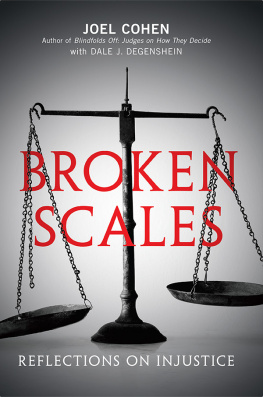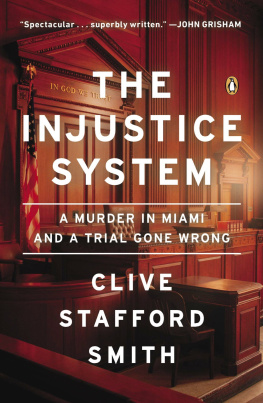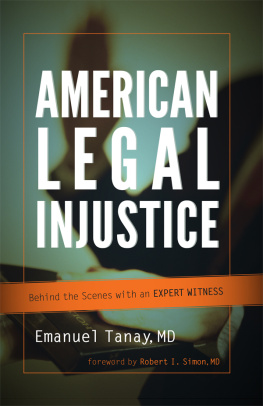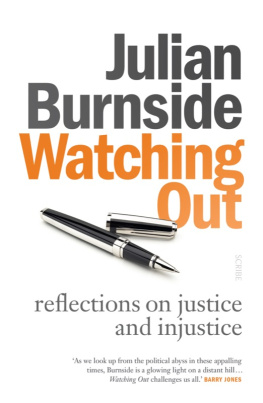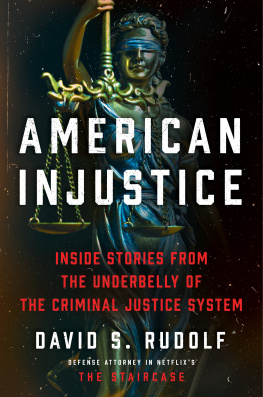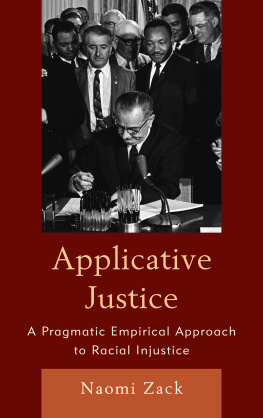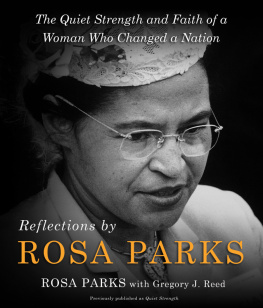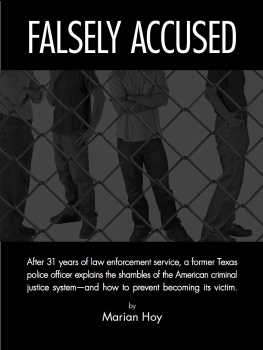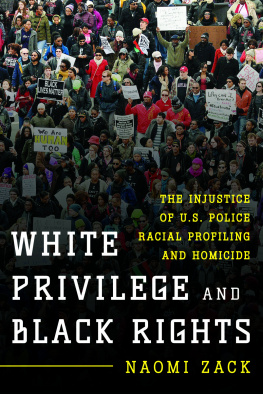Praise for Broken Scales: Reflections on Injustice
Even for the most diligent students of our judicial system, Joel Cohens penetrating examination of injustice in America, and how victims and perpetrators have responded to it, will stun readers and provoke much needed debate. A judicial must read.
Judith Miller, Fox News contributor;
City Journal, Contributing Editor;
Tablet Magazine
The thought that ours is a nation of laws, not of men, lends security, a sense of certainty, and a predictability to our lives. However, Joel Cohen, in his remarkable book, Broken Scales , through insightful narrative, interviews, and case histories demonstrates how prosecutors, judges, and manipulators of the system too often lead to injustice and the destruction of lives under the rubric of the rule of law.
Sol Wachtler, retired Chief Judge,
New York Court of Appeals
Americas system of justice may be reasonably well understood, but its system of injusticeand the experiences of those unfortunates caught within itare not. Joel Cohen introduces us to that system and a few of those peoplesome famous, most forgotten or never knownand, fine lawyer that he is, elicits their stories both clinically and compellingly.
David Margolick, Contributing Editor,
Vanity Fair; author, including
At the Bar: The Passions and
Peccadilloes of American Lawyers
Cohen, who has skillfully practiced criminal law from both sides, writes prolifically about law, social justice, morality, and even the Bible. Against that backdrop, he presents a diverse group of individuals who discuss their very different narratives about injustice. The collage of those interviews provides a unique perspectivereminding us how our justice system can so easily break down into injustice.
Barry Scheck, co-founder,
Innocence Project
A highly readable, intelligent, deeply felt book about injustice: wrongful convictions and sentences; false accusations; shattered lives; destroyed reputations; judges penalized for unpopular decisions. Read these compelling interviews; youll be glad you did.
Ira Glasser, former Executive
Director (19782001, retired),
American Civil Liberties Union
Broken Scales makes pristinely clear that Americas justice scales are weighted and extremely imbalanced. This should be required reading for every congressperson, prosecutor, and judge. Maybe, just maybe, it can help change how justice is administered in the United States.
Don Siegelman,
former Governor, Alabama
JOEL COHEN
Author of Blindfolds Off: Judges on How They Decide
with DALE J. DEGENSHEIN
BROKEN SCALES
REFLECTIONS ON INJUSTICE
He who commits injustice is ever made more wretched than he who suffers it.
Plato
Contents
Glenn Ford discussed by A. Martin Stroud III
Michael Wayne Haley discussed by Eric M. Albritton
Abdallah Higazy
Kenneth F. Ireland, Jr .
Miriam Moskowitz
Steven Pagones
Adam Sirois
Jeffrey Sterling
A. Ashley Tabaddor
Marsha Ternus
About the Authors
Joel Cohen is a highly respected white collar criminal defense lawyer in New York. He has practiced in that field, as well as complex civil litigation, at Stroock & Stroock & Lavan LLP for nearly 30 years, after having worked for ten years as a prosecutor with the New York State Special Prosecutors Office and then with the U.S. Department of Justices Organized Crime and Racketeering Section in the Eastern District of New York. Joel writes regularly for the New York Law Journal , The Hill , Huffington Post , law.com, and others on criminal law, legal ethics, and social policy. He frequently lectures lawyers, judges, and the public on varied issues, including ethics and religion. He has taught professional responsibility and currently teaches a class at Fordham Law School, How Judges Decide, based on his earlier book, Blindfolds Off: Judges on How They Decide , published by ABA Publishing in 2014. Joel has published several works of Biblical fiction, including Moses: A Memoir, David and Bathsheba: Through Nathans Eyes, and Moses and Jesus: A Conversation. Finally, he has also authored Truth Be Veiled, a Justin Steele Murder Case , a novel that addresses the criminal lawyers dilemma in dealing with the truth.
Dale J. Degenshein has practiced law since 1984, and has worked at Stroock since 2007. She frequently writes articles on the law and contributed to Blindfolds Off as well as Joels periodic articles over the last four years.
Foreword
by Honorable Nancy Gertner (Ret.)
Joel Cohen has compiled riveting narratives of injustice in the justice system, but not the usual onesthe ones the public has been hearing about far too often. These are not simply accounts of DNA exonerations stemming from botched investigations or official misconduct. The stories he recounts are equally troubling, if that is even possible. These are narratives of injustice imbedded in the justice system and all too often ignored. And they are told through actual interviews with a variety of participantsthe wrongly convicted, to be sure, but also the prosecutor whose advocacy blinded him to the unfairness of a conviction, the defense lawyer who battled for a client that everyone agreed should not be in jail, and the judge who is not reelected after ruling for gay marriage.
One story had special resonance for me; I was a U.S. district court judge for 17 years and presided over challenges to state and federal convictions. The writ of habeas corpus, which should have provided a meaningful review of serious charges and substantial penalties, devolved into running the gauntlet of procedural barrier after procedural barrier, too often masking outcomes that in some cases I strongly believed to have been unjust. It was an Alice in Wonderland of technical trip wires, barring access to the courts for those wrongly convicted and providing opportunities for the prosecutors who happily took advantage of them.
Michael Wayne Haley was one such case, portrayed by Cohen through an interview with his lawyer, Eric M. Albritton. Haley was guilty of stealing a calculator from Walmart, but he was wrongly tried as a habitual offender. Texass three strikes law required two prior sequential felony convictions; his recordwhile surely not admirabledid not fit the statutes requirements so that he was innocent of being a habitual offender. The difference was criticala petty crime with two years in jail, or a habitual offender sentenced to 16-and-a-half years. Working pro se, Haley read the statute carefully; apparently, no one else didnot the trial judge, the prosecutor, or the defense lawyer. He filed motions claiming that he was erroneously convicted as a habitual offender. The state courts and then the federal court rejected the claim, at the insistence of the prosecutor, not because it wasnt true; everyone agreed it was. But rather because of a procedural default, which, to lay ears, must surely sound like something out of Hellers Catch 22 : The procedural default was the failure to raise the issue, but the issue had not been raised precisely because everyone had missed it. Ultimately, the case went to the Supreme Court (argued by Texass Solicitor General Ted Cruz), and through its procedural machinations, Haley was resentenced to the two years after he had served six.
What the lawyers and judges were doing from the moment they realized that Haley had been wrongly convicted may have looked like justice; the judges in their robes, the lawyers citing to cases, the American flag behind them. But it was not justice, as Albritton said: The State of Texas was myopically focused on the principle that no matter how wrong or how unfair, federal courts ought not interfere in state convictions. And he added, What I find outrageous is that policy considerations eclipsed common sense.

